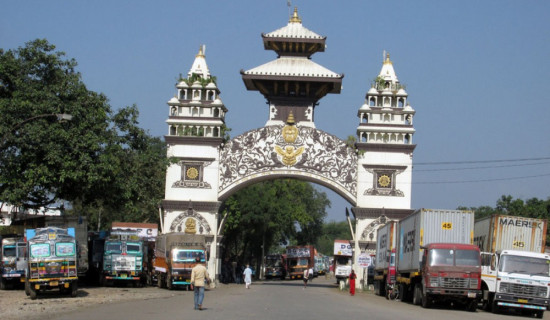- Sunday, 15 February 2026
Remarkable Journey Towards Sanitation
World Toilet Day, observed annually on November 19, is a global event that aims to raise awareness about the importance of access to clean and safe sanitation facilities. In Nepal, this day holds significant importance as the country has made remarkable progress in improving sanitation conditions and ensuring access to toilets for its citizens. This opinion aims to shed light on Nepal's commitment to addressing the sanitation crisis, the challenges faced, and the transformative impact it has had on the lives of its people.
From 2000 to 2017, the percentage of households using improved sanitation facilities in Nepal increased from 15 per cent to 62 per cent, and open defecation rates fell from 67 per cent to 21 per cent over the same period (WHO & UNICEF, 2019). Nonetheless, still a lot to be done in Nepal to improve sanitation conditions and sustain whatever it has achieved.
The Crisis
Nepal, a landlocked country in South Asia, has long struggled with a sanitation crisis. Lack of access to proper sanitation facilities posed significant health risks, particularly in rural areas, where open defecation was prevalent. The consequences of poor sanitation were dire, with diseases like diarrhoea, cholera, and typhoid spreading rapidly, especially among children.
Nepal's Commitment to Sanitation is commendable. Recognising the urgent need to address the sanitation crisis, Nepal made a commitment to achieving the Sustainable Development Goal (SDG) 6, which aims to ensure access to clean water and sanitation for all by 2030. The government, in collaboration with various stakeholders, launched the Nepal Sanitation and Hygiene Master Plan in 2011, outlining a comprehensive strategy to improve sanitation facilities across the country.
The Nepali government introduced and implemented several initiatives and policies to promote sanitation and hygiene practices. The Community-Led Total Sanitation (CLTS) approach was adopted, focusing on behaviour change and community participation. This approach empowered communities to take ownership of their sanitation facilities, leading to sustainable improvements. The government also launched the "One Home, One Toilet" campaign, which aimed to ensure that every household had access to a toilet. This campaign involved providing financial incentives and technical support to families, particularly those from marginalised communities, to construct toilets.
Additionally, the government provided subsidies for the construction of public toilets in schools, health centres, and other public places. Nepal's commitment to improving sanitation was further strengthened through partnerships with international organisations and support from the global community. The United Nations Children's Fund (UNICEF), the World Health Organisation (WHO), and other NGOs played a crucial role in providing technical assistance, capacity building, and financial support. The Transformative Impact: Nepal's commitment to improving sanitation has had a transformative impact on the lives of its people, particularly in rural areas. Access to clean and safe sanitation facilities has not only improved public health but has also brought about social and economic changes.
In this background, the availability of toilets has significantly reduced the prevalence of waterborne diseases in Nepal. Access to clean water and sanitation has led to a decline in diarrheal diseases, which were once a leading cause of child mortality. The reduction in disease burden has allowed children to attend school regularly, improving their educational outcomes. The provision of toilets has had a profound impact on the dignity and well-being of individuals, especially women and girls.
Prior to the sanitation initiatives, women and girls faced numerous challenges, including the risk of harassment and assault when practicing open defecation. The availability of toilets has not only ensured their safety but has also empowered them to pursue education and economic opportunities. Economic benefits far outweigh the investment in the case of toilet construction. Improved sanitation has also brought economic benefits to Nepal. The reduction in healthcare costs associated with waterborne diseases has allowed families to allocate their resources towards other essential needs. Additionally, the construction and maintenance of toilets have created employment opportunities, contributing to local economic development.
Way Forward
Despite the significant progress made, Nepal still faces challenges in achieving universal access to sanitation. Limited financial resources, geographical barriers, and cultural practices are some of the obstacles that need to be addressed. The government needs to continue investing in sanitation infrastructure, ensuring its sustainability and maintenance. Education and awareness campaigns should be intensified to promote proper hygiene practices and dispel cultural taboos surrounding sanitation. Community engagement and participation remain crucial in ensuring the success of sanitation initiatives. Moreover, the government should focus on targeting vulnerable and marginalised communities to ensure that no one is left behind.
Nepal's commitment to improving sanitation on World Toilet Day is a testament to its dedication to the well-being and dignity of its citizens. The progress made in providing access to clean and safe sanitation facilities has had a transformative impact on public health, gender equality, and economic development. While challenges persist, Nepal's journey towards achieving universal access to sanitation serves as an inspiration to other nations facing similar issues. As we commemorated World Toilet Day, let us celebrate Nepal's achievements and reiterate our commitment to ensuring access to sanitation for all throughout the year.
(Dr. Lohani is the executive director at the Health Concern, Nepal. lohanis@gmail.com)

















